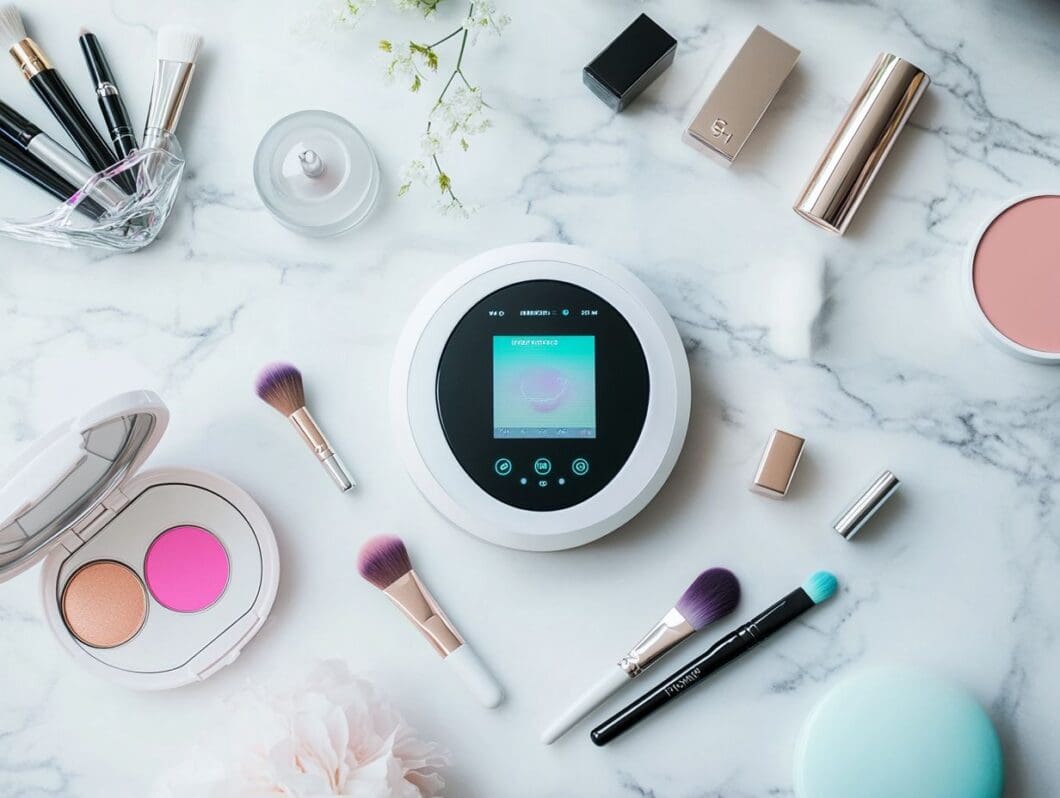In recent years, beauty technology has transformed the way we approach skincare, hair care, and makeup.
From innovative devices to personalized formulations, advancements are reshaping the beauty landscape, making routines more effective and convenient.
This article explores the latest trends in beauty tech, the benefits they bring, and the ethical considerations that accompany them.
As we look ahead, we will also discuss potential future developments that could revolutionize our beauty practices even further.
Dive in to discover how technology is enhancing beauty and what it means for you!
Key Takeaways:
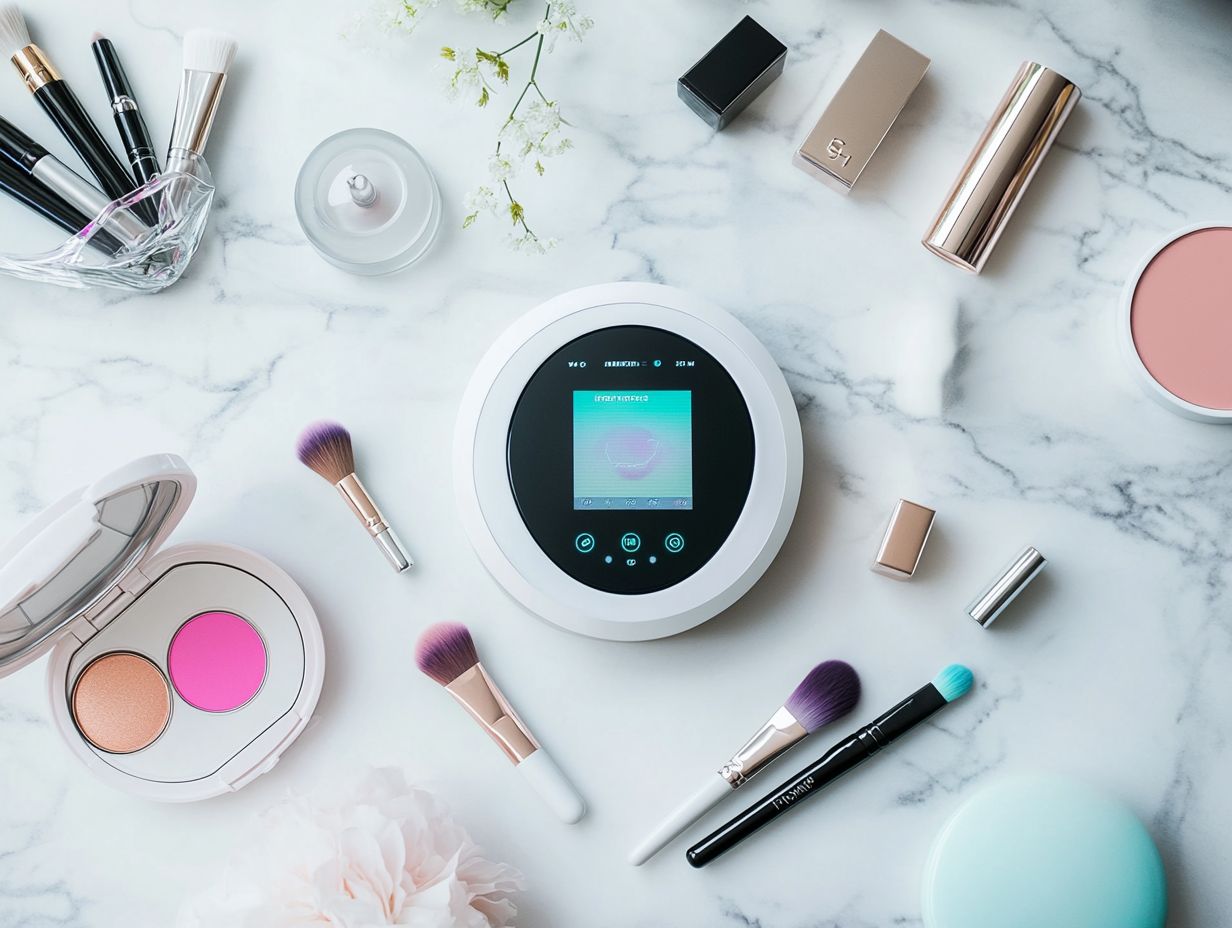
Defining Beauty Tech and its Impact
Beauty technology has become a significant force in the realm of personal care, utilizing innovations such as artificial intelligence in skincare and smart mirrors to transform consumer interactions with cosmetic products.
This evolution includes a wide range of advanced solutions designed to meet diverse beauty requirements, including precision and skin analysis, while also addressing dermatological concerns through state-of-the-art technologies.
As trends in beauty technology continue to advance, the influence of these innovations on consumer behavior, product recommendations, and overall engagement within the beauty industry is substantial and warrants careful consideration.
New Trends in Beauty Technology
The landscape of beauty technology is evolving rapidly, with emerging trends poised to revolutionize consumer approaches to skincare, hair analysis, and cosmetic applications.
Innovations such as virtual try-on solutions and augmented reality enable users to experiment with cosmetic products prior to purchase, while generative AI offers personalized solutions tailored to individual preferences and needs.
These advancements not only enhance the consumer experience but also provide brands with valuable insights into market demands and consumer behavior.
Emerging Technologies in Skincare
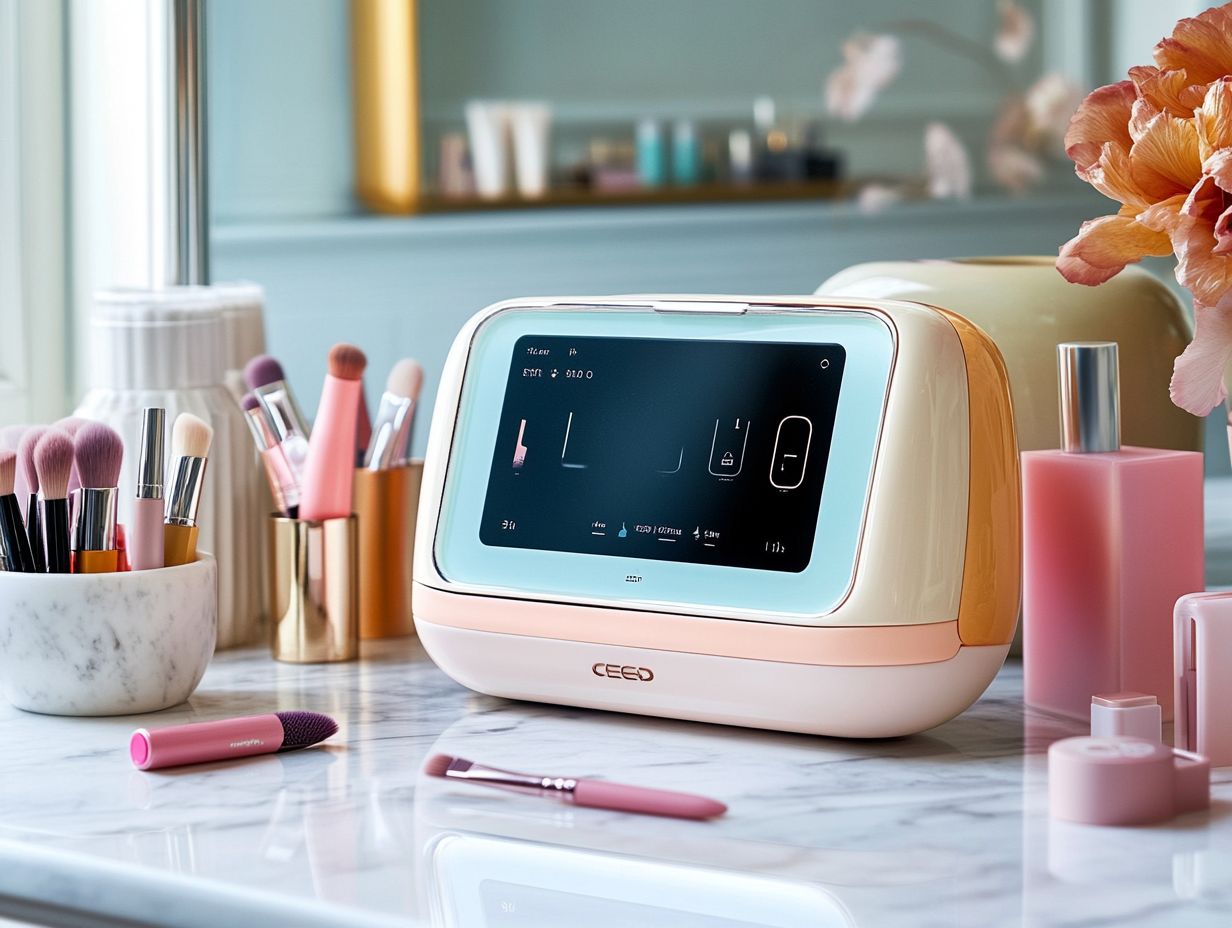
Emerging technologies in skincare are fundamentally transforming how consumers address their dermatological concerns, with AI-driven skincare solutions offering advanced skin analyses that identify individual needs. By employing wearable beauty devices and sophisticated algorithms, users can access real-time data and receive recommendations tailored to their specific skin conditions.
This movement towards ingredient transparency and well-considered choices gives the power to consumers to make more enlightened choices regarding their skincare routines and product selections. For more insights, check out Innovations in Beauty Tech: What’s New.
Smart mirrors equipped with augmented reality capabilities enable individuals to visualize the effects of products prior to application, thus fostering a deeper understanding of what is most effective for their skin type.
Brands are increasingly capitalizing on these innovations to establish stronger connections with their audiences, promoting personalized experiences that align with the specific demands of consumers.
Furthermore, the integration of blockchain technology ensures transparency in ingredient sourcing, thereby building trust between businesses and users.
As these advancements continue to evolve, they lay the foundation for a more customized and effective skincare landscape, ultimately challenging traditional formulations and user experiences.
Revolutionizing Hair Care
The hair care industry is experiencing a significant transformation, propelled by innovations in hair analysis and advanced haircare solutions aimed at addressing a diverse range of scalp conditions and hair types. Cutting-edge diagnostic tools facilitate personalized product recommendations, enabling consumers to achieve optimal results tailored to their specific needs. As health tracking becomes more intertwined with beauty technology, the pursuit of healthier, more vibrant hair is becoming increasingly attainable and informed.
Contemporary brands are utilizing artificial intelligence to analyze individual hair characteristics, allowing for the formulation of products that cater specifically to these traits. For example, some companies now provide applications that assess hair texture, damage levels, and hydration, offering users an interactive experience that was previously unavailable.
This evolution not only give the power tos consumers to make informed decisions but also prompts brands to develop targeted strategies that resonate with diverse audiences. Ultimately, such technological advancements enhance customer loyalty and influence purchasing behaviors, rendering the hair care market more competitive and dynamic than ever.
Advancements in Makeup and Cosmetics
Advancements in makeup and cosmetics are significantly redefining the beauty landscape, introducing innovative solutions such as 3D-printed makeup and virtual try-on technologies that enhance consumer engagement. These developments facilitate the selection of cosmetic formulations and promote eco-friendly packaging practices that resonate with environmentally conscious consumers. By adopting these beauty innovations, brands can effectively meet the evolving demands of the market while enhancing the overall shopping experience.
The integration of 3D-printing technology allows cosmetic brands to customize products according to individual preferences, enabling users to create unique shades and textures that align with their personal style. Concurrently, virtual try-on technologies have transformed the way consumers experiment with makeup by providing a risk-free platform that allows them to visualize how products will appear on their skin prior to making a purchase.
Moreover, the industry’s push toward sustainability encourages companies to adopt eco-friendly practices, such as utilizing biodegradable packaging and clean ingredients, thereby appealing to a generation that prioritizes ethical consumption. These combined advancements not only enhance consumer interaction with beauty products but also signify a shift toward a more responsible and personalized approach within the beauty industry.
Benefits of Beauty Tech
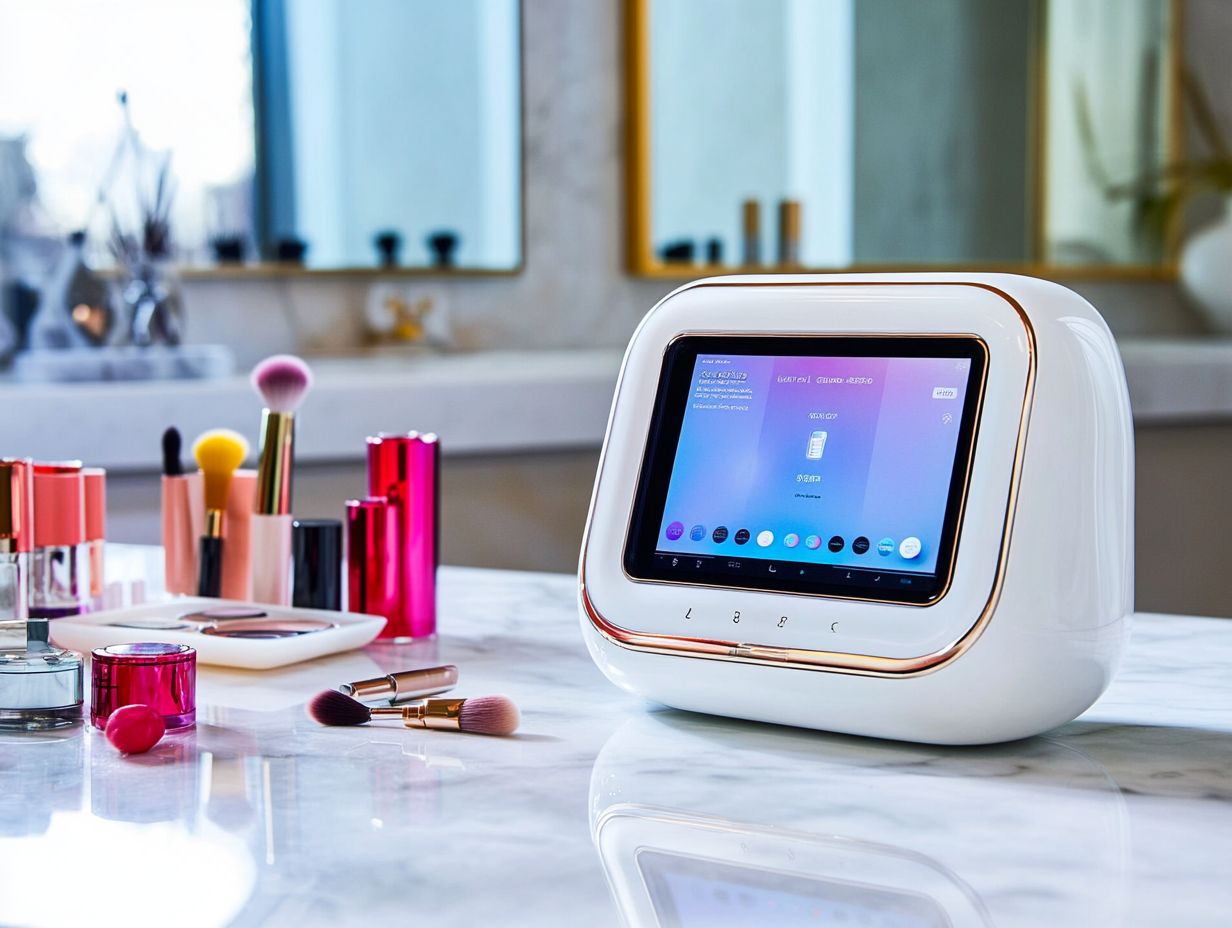
The advantages of beauty technology extend well beyond mere convenience, providing enhanced efficacy and personalized solutions that address the specific needs of individual consumers.
By utilizing advanced technologies, brands can obtain emotional insights into consumer preferences, enabling the development of tailored products and fostering more meaningful engagement.
This evolution not only elevates the consumer experience but also promotes brand loyalty and trust through increased transparency and relevance.
Improved Efficacy and Convenience
Beauty technology significantly enhances both effectiveness and convenience, with innovations such as smart mirrors and machine learning algorithms optimizing the beauty routine for consumers. As these technologies advance, they provide personalized recommendations and real-time feedback, enabling users to make informed decisions regarding their personal care products. This seamless integration of technology not only enhances outcomes but also conserves time in the often busy lives of consumers.
Features such as augmented reality tools allow users to virtually try on makeup, ensuring they select the ideal shade without the complications of physical trials. This capability fosters greater confidence and encourages experimentation, thereby making the beauty experience more enjoyable.
Connected devices can deliver reminders for skincare regimens, ensuring that essential steps are never neglected. By leveraging advancements in beauty technology, individuals are not only keeping abreast of trends but also optimizing their daily routines, ultimately resulting in healthier skin and increased consumer satisfaction.
Personalized Solutions
Personalized solutions are at the forefront of beauty technology, with advancements in personalization technology and artificial intelligence algorithms enabling brands to provide tailored product recommendations that resonate with individual consumers. This shift toward customization not only enhances consumer engagement but also fosters a deeper connection between beauty brands and their clientele.
By gaining insights into unique skin conditions and preferences, brands can create impactful experiences that significantly elevate customer satisfaction.
For instance, AI-driven platforms are capable of analyzing users’ skin types, tones, and specific concerns, such as acne or aging, ensuring that each recommendation is as precise as possible. Brands such as Lancôme and L’Oréal have adopted this approach, utilizing advanced algorithms to develop virtual try-on experiences and personalized skincare regimens.
Effective consumer engagement strategies, including interactive quizzes and real-time feedback systems, allow users to become more invested in their beauty journeys. This transformative trend not only benefits consumers by simplifying their decision-making processes but also give the power tos brands to cultivate loyalty and trust by addressing personal needs more efficiently.
Ethical Concerns and Considerations
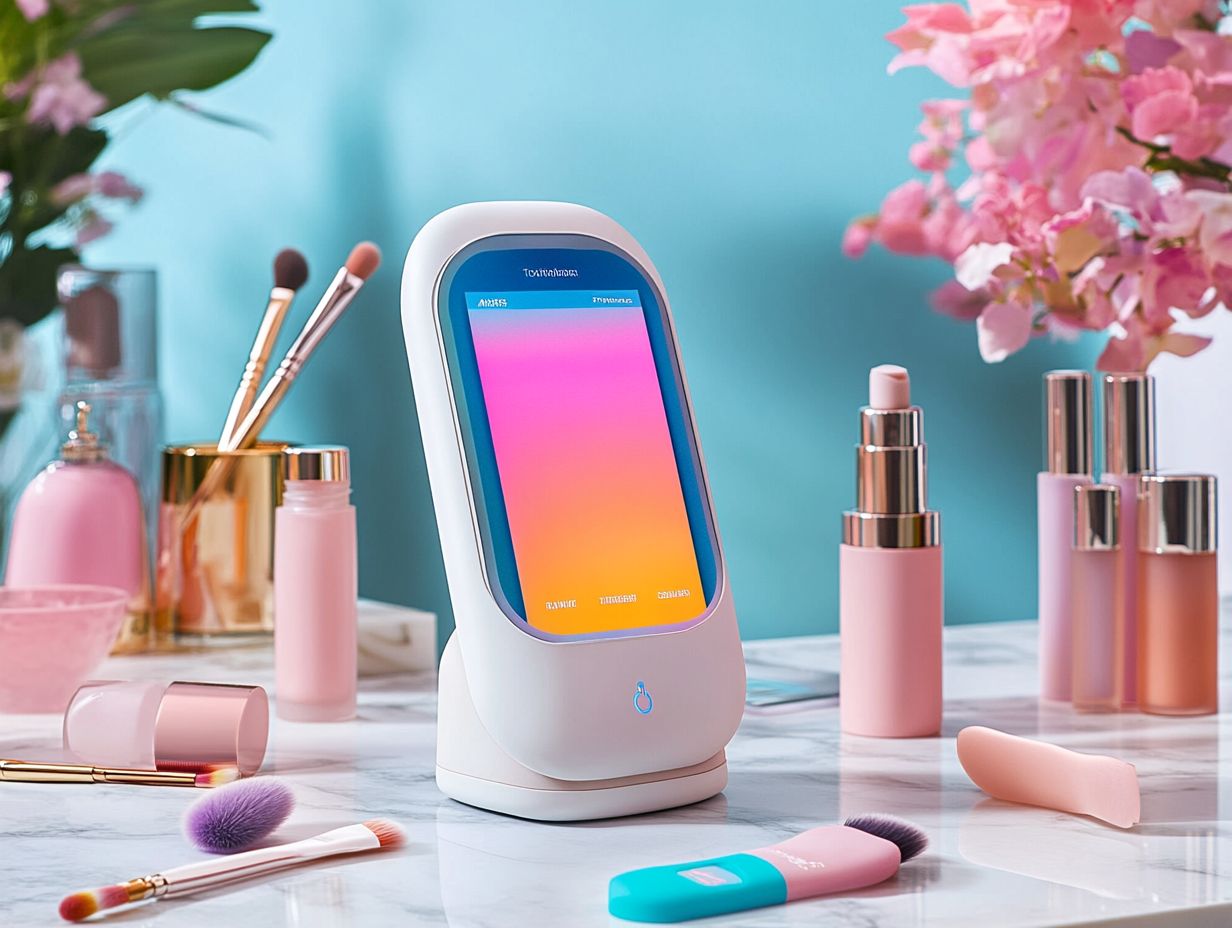
As beauty technology continues to advance, ethical concerns and considerations regarding its impact on consumers and the environment are becoming increasingly significant. Issues such as ethical AI practices, regulatory compliance, and ingredient transparency are critical for brands to address in order to preserve trust and credibility within the beauty industry.
It is essential to balance innovation with ethical responsibilities, particularly as consumers become more informed and discerning in their purchasing decisions.
Addressing Environmental and Social Impact
Addressing the environmental and social impact of beauty technology is essential for brands striving to promote sustainability and social responsibility within the industry. Innovations such as eco-friendly packaging and sustainable sourcing practices are critical steps toward minimizing the ecological footprint of beauty products. As consumers increasingly prioritize brands that reflect their values, the obligation to adopt environmentally conscious practices becomes a fundamental aspect of brand identity.
In response to this growing demand, numerous brands are now investing in renewable materials and utilizing biodegradable alternatives to traditional plastics, significantly reducing waste. Companies are also re-evaluating their supply chains to ensure ethical labor practices and sustainable sourcing of ingredients, which not only benefits the environment but also enhances community well-being.
The integration of clean technology in product formulation and manufacturing processes underscores a commitment to transparency and responsibility. By embracing these changes, brands can strategically position themselves in a competitive market while appealing to a more conscientious consumer base.
The Future of Beauty Tech
The future of beauty technology presents significant opportunities, with emerging trends poised to introduce innovations that will transform the beauty landscape.
As advancements in AI diagnostics, health tracking, and blockchain technology progress, brands will have the potential to deliver unparalleled levels of personalization and transparency to consumers.
These developments are expected to redefine the processes by which beauty products are created, marketed, and utilized, thereby fostering an era characterized by informed and give the power toed beauty choices.
Predictions and Potential Developments
Predictions regarding the beauty tech landscape suggest a significant increase in developments that will shape the industry in the coming years. As brands leverage technology to improve consumer engagement and streamline the beauty experience, there will be a heightened focus on personalization and data-driven solutions. These advancements are expected to influence not only product offerings but also reshape consumer expectations and interactions with brands.
Among the most noteworthy developments are augmented reality (AR) applications that enable customers to visualize products on their skin prior to making a purchase. Furthermore, artificial intelligence (AI) is increasingly being utilized to analyze individual skin types and preferences, resulting in tailored recommendations for skincare and cosmetics.
Innovations in sustainable practices, such as biodegradable packaging and cruelty-free formulations, are anticipated to gain prominence as environmentally conscious consumers demand greater transparency. Collectively, these elements indicate a transformative shift that positions beauty tech not merely as an enhancement of traditional practices but as a comprehensive reimagining of the relationship between consumers and products.


